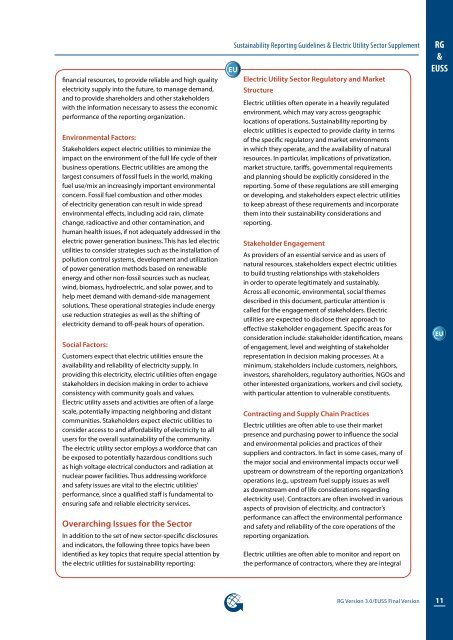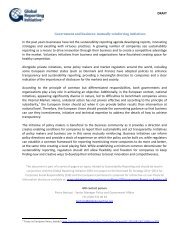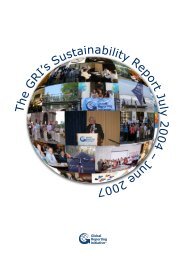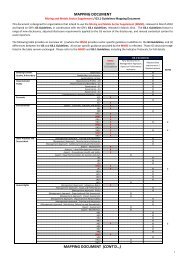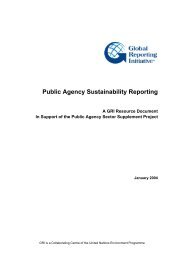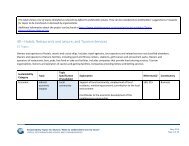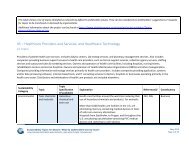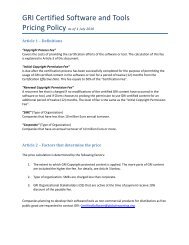Electric Utilities Sector Supplement - Global Reporting Initiative
Electric Utilities Sector Supplement - Global Reporting Initiative
Electric Utilities Sector Supplement - Global Reporting Initiative
Create successful ePaper yourself
Turn your PDF publications into a flip-book with our unique Google optimized e-Paper software.
financial resources, to provide reliable and high quality<br />
electricity supply into the future, to manage demand,<br />
and to provide shareholders and other stakeholders<br />
with the information necessary to assess the economic<br />
performance of the reporting organization.<br />
Environmental Factors:<br />
Stakeholders expect electric utilities to minimize the<br />
impact on the environment of the full life cycle of their<br />
business operations. <strong>Electric</strong> utilities are among the<br />
largest consumers of fossil fuels in the world, making<br />
fuel use/mix an increasingly important environmental<br />
concern. Fossil fuel combustion and other modes<br />
of electricity generation can result in wide spread<br />
environmental effects, including acid rain, climate<br />
change, radioactive and other contamination, and<br />
human health issues, if not adequately addressed in the<br />
electric power generation business. This has led electric<br />
utilities to consider strategies such as the installation of<br />
pollution control systems, development and utilization<br />
of power generation methods based on renewable<br />
energy and other non-fossil sources such as nuclear,<br />
wind, biomass, hydroelectric, and solar power, and to<br />
help meet demand with demand-side management<br />
solutions. These operational strategies include energy<br />
use reduction strategies as well as the shifting of<br />
electricity demand to off-peak hours of operation.<br />
Social Factors:<br />
Customers expect that electric utilities ensure the<br />
availability and reliability of electricity supply. In<br />
providing this electricity, electric utilities often engage<br />
stakeholders in decision making in order to achieve<br />
consistency with community goals and values.<br />
<strong>Electric</strong> utility assets and activities are often of a large<br />
scale, potentially impacting neighboring and distant<br />
communities. Stakeholders expect electric utilities to<br />
consider access to and affordability of electricity to all<br />
users for the overall sustainability of the community.<br />
The electric utility sector employs a workforce that can<br />
be exposed to potentially hazardous conditions such<br />
as high voltage electrical conductors and radiation at<br />
nuclear power facilities. Thus addressing workforce<br />
and safety issues are vital to the electric utilities’<br />
performance, since a qualified staff is fundamental to<br />
ensuring safe and reliable electricity services.<br />
Overarching Issues for the <strong>Sector</strong><br />
In addition to the set of new sector-specific disclosures<br />
and indicators, the following three topics have been<br />
identified as key topics that require special attention by<br />
the electric utilities for sustainability reporting:<br />
EU<br />
Sustainability <strong>Reporting</strong> Guidelines & <strong>Electric</strong> Utility <strong>Sector</strong> <strong>Supplement</strong><br />
<strong>Electric</strong> Utility <strong>Sector</strong> Regulatory and Market<br />
Structure<br />
<strong>Electric</strong> utilities often operate in a heavily regulated<br />
environment, which may vary across geographic<br />
locations of operations. Sustainability reporting by<br />
electric utilities is expected to provide clarity in terms<br />
of the specific regulatory and market environments<br />
in which they operate, and the availability of natural<br />
resources. In particular, implications of privatization,<br />
market structure, tariffs, governmental requirements<br />
and planning should be explicitly considered in the<br />
reporting. Some of these regulations are still emerging<br />
or developing, and stakeholders expect electric utilities<br />
to keep abreast of these requirements and incorporate<br />
them into their sustainability considerations and<br />
reporting.<br />
Stakeholder Engagement<br />
As providers of an essential service and as users of<br />
natural resources, stakeholders expect electric utilities<br />
to build trusting relationships with stakeholders<br />
in order to operate legitimately and sustainably.<br />
Across all economic, environmental, social themes<br />
described in this document, particular attention is<br />
called for the engagement of stakeholders. <strong>Electric</strong><br />
utilities are expected to disclose their approach to<br />
effective stakeholder engagement. Specific areas for<br />
consideration include: stakeholder identification, means<br />
of engagement, level and weighting of stakeholder<br />
representation in decision making processes. At a<br />
minimum, stakeholders include customers, neighbors,<br />
investors, shareholders, regulatory authorities, NGOs and<br />
other interested organizations, workers and civil society,<br />
with particular attention to vulnerable constituents.<br />
Contracting and Supply Chain Practices<br />
<strong>Electric</strong> utilities are often able to use their market<br />
presence and purchasing power to influence the social<br />
and environmental policies and practices of their<br />
suppliers and contractors. In fact in some cases, many of<br />
the major social and environmental impacts occur well<br />
upstream or downstream of the reporting organization’s<br />
operations (e.g., upstream fuel supply issues as well<br />
as downstream end of life considerations regarding<br />
electricity use). Contractors are often involved in various<br />
aspects of provision of electricity, and contractor’s<br />
performance can affect the environmental performance<br />
and safety and reliability of the core operations of the<br />
reporting organization.<br />
<strong>Electric</strong> utilities are often able to monitor and report on<br />
the performance of contractors, where they are integral<br />
RG<br />
&<br />
EUSS<br />
EU<br />
RG Version 3.0/EUSS Final Version<br />
11


